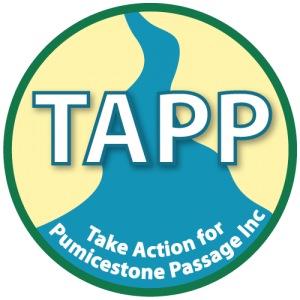Dr Ben Diggles1 (Digsfish Services), Elle Veary (OzFish Pumicestone), Fred Palin (Joondoburri)
Dr Ben Diggles is a marine biologist and Director of DigsFish Services, an internationally recognised fish health consulting company based on Bribie Island, which was established in 2003 to provide aquatic animal health services to industries and governments throughout Australasia. Dr Diggles has published hundreds of papers and reports over the past 30 years on issues as diverse as parasites and diseases of wild and aquacultured fish and shellfish, national and international biosecurity frameworks, pathogen risk analyses, fish welfare, fish kill investigations and environmental standards for fishing tournaments.
Abstract:
Holocene sea level rise (12000-7000 ybp) formed the pristine and highly productive Pumicestone Passage estuary, which provided sustenance and cultural services for indigenous peoples for thousands of years. Following European settlement in 1823, Pumicestone Passage remained a highly productive fishery with abundant finfish and shellfish resources. However, by the 1890’s eutrophication and sedimentation from catchment clearing began to damage the oyster fishery, first signalled by loss of biogenic subtidal shellfish reefs in formerly highly productive “dredge sections”. By the late 1960’s the oyster industry was in rapid decline due to emergence of QX, a disease process triggered by sedimentation and immune suppression due to chemical runoff from agriculture and forestry in adjacent river catchments. Throughout the 21st century decline of the ecological health of the passage has continued, signalled by accelerating frequencies of algal blooms and fish kill events.
Recent oyster gardening and shell recycling initiatives for the Pumicestone Shellfish Habitat Restoration trial at Kakadu Beach have raised community awareness of the loss of these ecosystems and the many critical ecological services they once provided, uncovering a groundswell of community support to reverse the decline. However, the Moreton Bay Marine Park was established in 1993 on a shifted management baseline which does not currently accommodate restoration of these critical ecosystems. In the face of continuing catchment development, only by a concerted effort to improve the quality of runoff and permit/promote active restoration of underwater habitats will governments and community be able to slow or reverse the decline of this highly stressed marine ecosystem.
